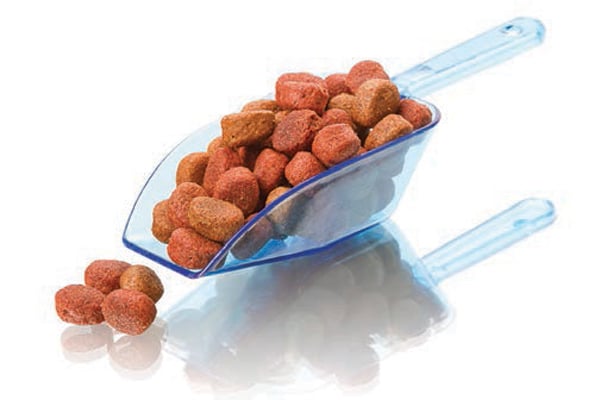The post The Best Dog Food for Itchy Skin by Elizabeth Anderson Lopez appeared first on Dogster. Copying over entire articles infringes on copyright laws. You may not be aware of it, but all of these articles were assigned, contracted and paid for, so they aren’t considered public domain. However, we appreciate that you like the article and would love it if you continued sharing just the first paragraph of an article, then linking out to the rest of the piece on Dogster.com.
You’re watching TV and hear it again — scratch, scratch, chew, chew. Yes, that sound can be annoying, but that’s nothing compared to how your dog feels trying to get relief from itchy skin or related ailments. So, how do you relieve itchy skin on dogs? One of the best ways to do it is through diet. Let’s look at the best dog food for itchy skin.
First, why do dogs get itchy skin?

Why do dogs get itchy skin in the first place? Photography ©Christian Buch | Getty Images.
Before we break down the best dog food for itchy skin, let’s look at why dogs get itchy. Just like when people get an itch, there are multiple possible reasons for dogs — a major one being allergies. But how to tell? Signs of allergies include itching, rash and hair loss, according to Doug Knueven, DVM, a holistic vet with Beaver Animal Clinic in Beaver, Pennsylvania.
Jean Dodds, DVM, founder of Hemopet, based in Garden Grove, California, says crusty sores with intermittent healing and acute breakouts can be signs of chronic skin infections.
“The most common cause of itchiness and skin self-trauma are allergic reactions to flea bites, environmental allergens and food allergy,” adds Sean J. Delaney, DVM, MS, DACVN (board certified Veterinary Nutritionist of the American College of Veterinary Nutrition), who operates Davis Veterinary Medical Consulting in Davis, California. “Collectively, these allergens work together to cause pruritus, the fancy word used for itchiness, in allergic dogs. Often eliminating or controlling even one of these allergens can lead to a reduction or elimination of signs.”
Dr. Dodds also cites Malassezia yeast infections, dry flaky skin and dandruff as causes of chronic itching, as well as chewing and licking feet.
Whether your dog has all-over itching or hot spots, which Dr. Knueven defines as “just an area of intensely itchy skin,” not treating the cause of your dog’s itching can make things worse, including pyoderma — another fancy word, this time for skin infections.
“Ignoring frequent or aggressive scratching can lead to inflammation and self-trauma and subsequent infection with bacteria and yeast present on the body or in the environment that normally is kept at bay by intact and healthy skin,” Dr. Delaney says.
And those problems can go beyond the physical: “Painful sores can lead to serious stress and behavioral issues with the constant skin irritation and itching,” Dr. Dodds says.
The best dog food for itchy skin

What is the best dog food for itchy skin? Photography ©ra3rn | Getty Images
While topical treatments may provide relief (or even a toy to get your dog’s mind temporarily focused elsewhere), don’t overlook the benefits that come from the inside-out approach. Namely, using food and supplements to help heal the skin while nourishing the body.
“Typically once flea bite preventive strategies are used (e.g., topical flea adulticide), one will try and see if addressing any underlying food allergies will help reduce scratching,” Dr. Delaney says. “This is done — as environmental allergens often cannot be completely avoided — and treatment is more challenging.”
But where to begin when it comes to the best dog food for itchy skin? Veterinarians describe multiple approaches. “Grain- and gluten- free foods are wise to start with, plus limiting meats and fowl to grass-fed rather than grain-fed,” according to Dr. Dodds.
“If skin issues are just a poor-quality coat or skin flakiness, a change to another commercial food slightly richer in essential nutrients that support skin health may be indicated,” Dr. Delaney says. “Key essential nutrients supporting skin health include protein, amino acids (especially an often limiting one, methionine), linoleic acid (the essential fatty acid), vitamin A, some B vitamins and trace minerals like zinc.”
When it comes to foods used to heal that itch, a discussion with your vet about your dog is likely in order because there is clearly no one answer — or cause. “It is important to realize that the protein from animal meats, poultry and fish, as well as from plants such as legumes, tubers and grains can all cause an allergic reaction,” Dr. Delaney says.
And finding what works may not be a case of one and done. “Rotate food sources every four to six weeks but not more often than every two weeks to help induce immune tolerance,” recommends Dr. Dodds.
How to switch your dog to find the best dog food for itchy skin

What is the best way to switch your dog’s diet? Photography ©mediaphotos | Getty Images.
When you change your dog’s diet in order to find the best dog food for itchy skin, avoid going cold turkey. “A switch to a raw diet, or any food change, should be done gradually,” Dr. Knueven says. “Start by adding ¼ the amount of the recommended daily amount of the new food and ¾ of the current diet. After a week, increase it to 50/50. After another week, go to ¾ new food and ¼ previous food. After a week, give just the new food.”
Dr. Delaney has another tip for transitioning to the best dog food for itchy skin. “The effects on the GI tract of a sudden diet change can be minimized by ensuring the new food truly is novel for the pet, and the fat, fiber and moisture levels are kept somewhat similar to the previous diet.”
What not to feed a dog with itchy skin

What should you avoid feeding a dog with itchy skin? Photography © GlobalP | iStock / Getty Images Plus.
Then there’s the flip side of determining what to feed a dog plagued by dermatological issues — what not to feed. Again, this can vary. Dr. Dodds recommends an Eastern medicine approach. “Avoid pro-inflammatory ‘hot’ foods in Chinese medicine like chicken and venison, plus related fats, oils and flavorings. Calming foods are turkey and white-colored fish. Avoid shellfish generally.”
Dr. Delaney recommends the above-mentioned novel approach when it comes to determining what food types to avoid. “Even if feeding an uncommonly fed allergen like venison works in many dogs, if a specific allergic dog has always been fed venison, a diet that uses a common food like chicken may be a better choice if the chicken is ‘novel’ or new to them.
“A food that has never been fed to a dog or that is novel to them is often fed in a limited-ingredient diet when food allergy is suspected or needs to be treated,” Dr. Delaney adds. “The ingredients are limited to reduce the potential number of allergens the dog is exposed to.
Finally, Dr. Knueven likes the DIY approach, preferring a balanced raw diet. “I think the benefit is especially apparent for dogs with allergies,” he says.
Should you supplement?

Will supplements help your dog’s itchy skin? Photography ©alphaspirit | Getty Images.
Along with changing the diet, you can also look into supplements that may help. “Fish oil supplementation can help decrease the inflammation of allergies, and probiotics can help rebalance the immune system,” Dr. Knueven says.
However, Dr. Delaney says, “At times, fatty acid supplements may be suggested, but it is best to select a food that already has an appropriate fatty acid profile than try to supplement a food that doesn’t.”
Dr. Dodds suggests oral supplements, as well as a topical one to help Scooby stop scratching. “Dogs must have plenty of omega-3 fatty acids plus some omega-6 fatty acids; coconut oil in moderation (as it’s high in fat) and apple cider vinegar in the food.” Topically, Dr. Dodds recommends green tea on sores and for foot soaks.
Dr. Delaney cautions that some human foods intended to help might actually hurt. “It is important to remember that any enjoyed treats should be cautiously used in case they introduce food allergens that are not novel or tolerated in a food-allergic dog.”
When to expect results

How soon after switching to a diet to combat itchy skin should you expect to see results? Photography ©ThamKC | Getty Images
Just as people want to see pounds lost on the scale the second day of a diet, when it comes to the best dog food for itchy skin, we often want immediate results after making a change in diet or adding a supplement. Veterinarians cited as little as a few days up to several months, depending on your dog’s condition.
“If there is an underlying food allergy, then response can take up to 12 weeks in some cases, with 8 weeks being more common,” Dr. Delaney says. “If the skin issue is solely related to poor skin or coat quality due to a diet that isn’t meeting a pet’s specific needs for an essential nutrient like a fatty acid, improvement may be noticed in as early as several weeks.”
Hopefully, this information serves as food for thought when it comes to giving your furry friend some relief. It might just result in the only scratching is you scratching his belly or behind his ears.
Is your dog susceptible to itchy skin?

Dogs with white or lighter coats are more susceptible to skin issues. Photography ©GlobalP | Getty Images
Veterinarians point out that any breed or dog can have allergies, but some may be more prone to skin issues. There are a couple different forms of “skin deep” traits that may boost allergy propensity.
“Dogs with white or lighter coat colors can be more susceptible because of the effects of sunlight exposure,” says W. Jean Dodds, DVM.
Sean J. Delaney, DVM, MS, DACVN, Board Certified Veterinary Nutritionist of the American College of Veterinary Nutrition, cited breeds with extra skin folds as more likely to have skin diseases or issues. “If a pet lover is considering a specific pure breed as a new family member, it is best to discuss this concern, as well as any others that may be more prevalent, with their veterinarian.”
Dr. Dodds adds that some underlying diseases can make some dogs more prone to skin issues, with the following as just some examples:
- Endocrinological — Hypothyroidism and thyroiditis
- Hyperactive adrenal function — Cushing’s disease
- Systemic autoimmune diseases — Discoid lupus, systemic lupus, Ehlers-Danlos syndrome and Sjögren (or Sjögren’s) syndrome
Fleas or food — which is the foe?
While either cause is painful, a trip to the vet is the first step in determining whether your dog’s itching and scratching is caused by fleas or food.
“Both can lead to self-trauma and infection,” says Sean J. Delaney, DVM, MS, DACVN, Board Certified Veterinary Nutritionist from the American College of Veterinary Nutrition. “The veterinarian will then treat any infection as well as address the root cause that led to the infection.”
Doug Knueven, DVM, a holistic veterinarian, starts with the “what’s most likely” approach.
“Flea allergy is the most common skin allergy,” Dr. Knueven says. “If an animal has fleas and is itching, I consider it a flea allergy until proven otherwise. The best way to rule out a food allergy is to switch the dog to a novel diet for eight weeks. If the skin clears, then he was allergic to something in the previous diet.”
Your dog can also be tested to pinpoint any allergens. W. Jean Dodds, DVM, describes the two types: “Serum-based environmental allergy screening (trees, weeds, grasses, pollens, fungi, molds, dust, fleas, etc.) and saliva-based (not serum-based) food-sensitivity testing.”
Tell us: What is the best dog food for itchy skin? What helped your dog stop itching?
Thumbnail: Photography by cmannphoto/istock.
About the author
Elizabeth Anderson Lopez is an award-winning writer based in Lake Forest, California. She and her husband have many pets, including two English Bull Terrier rescues named Dexter and Maybelene. You can contact her at fromconcepttocontent.com.
Editor’s note: This article appeared in Dogster magazine. Have you seen the new Dogster print magazine in stores? Or in the waiting room of your vet’s office? Subscribe now to get Dogster magazine delivered straight to you!
Read more about dog food on Dogster.com:
The post The Best Dog Food for Itchy Skin by Elizabeth Anderson Lopez appeared first on Dogster. Copying over entire articles infringes on copyright laws. You may not be aware of it, but all of these articles were assigned, contracted and paid for, so they aren’t considered public domain. However, we appreciate that you like the article and would love it if you continued sharing just the first paragraph of an article, then linking out to the rest of the piece on Dogster.com.
No comments:
Post a Comment